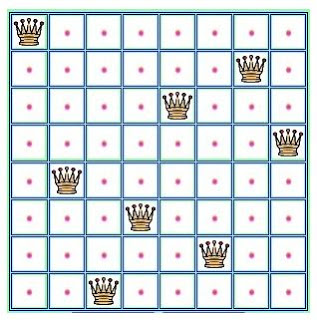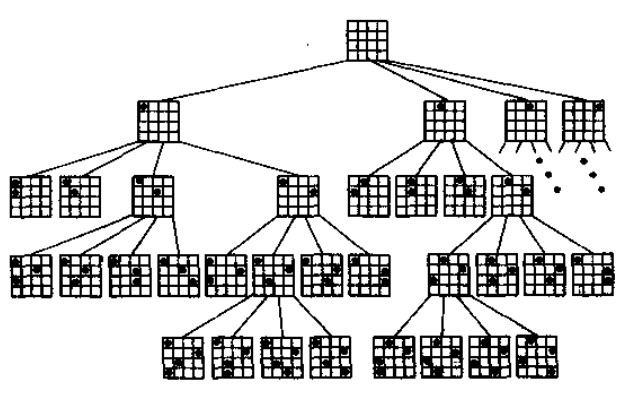LeetCode: 【L4】N-Queens 解题报告
【L4】N-Queens 解题报告

N-Queens Total Accepted: 16418 Total Submissions: 63309 My
Submissions
The n-queens puzzle is the problem of placing n queens on an n×n
chessboard such that no two queens attack each other.
Given an integer n, return all distinct solutions to the n-queens
puzzle.
Each solution contains a distinct board configuration of the
n-queens' placement, where 'Q' and '.' both indicate a queen and an
empty space respectively.
For example,
There exist two distinct solutions to the 4-queens puzzle:
[
[".Q..", // Solution 1
"...Q",
"Q...",
"..Q."],
["..Q.", // Solution 2
"Q...",
"...Q",
".Q.."]
]
经典的八皇后问题。
SOLUTION 1:
<此题的难度级别为LEVEL-4>
使用DFS来求解。
主页君写了二个版本来求解。
第一个版本,放置一个皇后之后,从某皇后之后找所有的可能的放置点。这样在Eclipse中可以测试通过,但是
过不了Leetcode的检查。也就是说复杂度过高了。
解法1
"...Q",
"Q...",
"..Q."],
["..Q.", // Solution 2
"Q...",
"...Q",
".Q.."]
]
经典的八皇后问题。
SOLUTION 1:
<此题的难度级别为LEVEL-4>
使用DFS来求解。
主页君写了二个版本来求解。
第一个版本,放置一个皇后之后,从某皇后之后找所有的可能的放置点。这样在Eclipse中可以测试通过,但是
过不了Leetcode的检查。也就是说复杂度过高了。
解法1
SOLUTION 2:
后来查资料后,得知为了加快搜索速度,我们应该以这样的思路来思考:
1. 假如我们要放置8个皇后,皇后是会攻击同行的,所以8行必须一行放置一个皇后。
所以前面主页君从某个皇后一直搜索到最后是没有必要的。我们要做的是:放置好一个皇后后,搜索下一行中
能否再放一个皇后,如果是不可以,直接就能返回了。这样子可以节省大量的计算量:

主页君代码如下:
GitHub代码链接
后来查资料后,得知为了加快搜索速度,我们应该以这样的思路来思考:
1. 假如我们要放置8个皇后,皇后是会攻击同行的,所以8行必须一行放置一个皇后。
所以前面主页君从某个皇后一直搜索到最后是没有必要的。我们要做的是:放置好一个皇后后,搜索下一行中
能否再放一个皇后,如果是不可以,直接就能返回了。这样子可以节省大量的计算量:

主页君代码如下:
GitHub代码链接
December 17th, 重写如下:

1 public class Solution { 2 public List<String[]> solveNQueens(int n) { 3 List<String[]> ret = new ArrayList<String[]>(); 4 5 if (n == 0) { 6 return ret; 7 } 8 9 dfs(n, new ArrayList<Integer>(), ret); 10 return ret; 11 } 12 13 public String[] createSolution(ArrayList<Integer> path) { 14 /* 15 [ 16 [".Q..", // Solution 1 17 "...Q", 18 "Q...", 19 "..Q."], 20 21 ["..Q.", // Solution 2 22 "Q...", 23 "...Q", 24 ".Q.."] 25 ] 26 */ 27 int size = path.size(); 28 String[] ret = new String[size]; 29 30 for (int i = 0; i< size; i++) { 31 StringBuilder sb = new StringBuilder(); 32 for (int j = 0; j < size; j++) { 33 // a queen. 34 if (j == path.get(i)) { 35 sb.append('Q'); 36 } else { 37 sb.append('.'); 38 } 39 } 40 41 ret[i] = sb.toString(); 42 } 43 44 return ret; 45 } 46 47 //ArrayList<Integer> path: store the index of the columns of one solution. 48 public void dfs(int n, ArrayList<Integer> path, List<String[]> ret) { 49 if (path.size() == n) { 50 String[] solution = createSolution(path); 51 ret.add(solution); 52 return; 53 } 54 55 for (int i = 0; i < n; i++) { 56 // Judge if this is a solution; 57 if (!isValid(path, i)) { 58 continue; 59 } 60 61 path.add(i); 62 dfs(n, path, ret); 63 path.remove(path.size() - 1); 64 } 65 } 66 67 public boolean isValid(ArrayList<Integer> path, int index) { 68 int size = path.size(); 69 for (int i = 0; i < size; i++) { 70 // Same column as one queen. 71 if (index == path.get(i)) { 72 return false; 73 } 74 75 // 在两条对角线之上 76 // bug 3: 少一个) 77 if (size - i == Math.abs(index - path.get(i))) { 78 return false; 79 } 80 } 81 82 return true; 83 } 84 }
步骤:
1. 建立一个arraylist存储每一行的皇后的列值。
例如:第一行皇后在第三列,第二行皇后在第五列,我们会记录3,5在arraylist中,依次这样推下去。
2. 进入DFS后,首先判断array是不是满,满的话说明8个皇后都放好了,创建一个解并返回。
3. 如果没有满,扫描当前行所有的位置,查找是不是能放一个皇后。如果可以放,继续DFS。不能放的话,就退出就好了。
虽然本题了解了思路后,写出来并不难,但主页君认为难点是在于:你怎么能思考到一行一行放皇后?而不是放好一个再找下一个可能放的点?如果想清楚了这一点也就不难了。
LEVEL 4还是实至名归的。
posted on 2014-12-17 19:09 Yu's Garden 阅读(993) 评论(0) 编辑 收藏 举报




